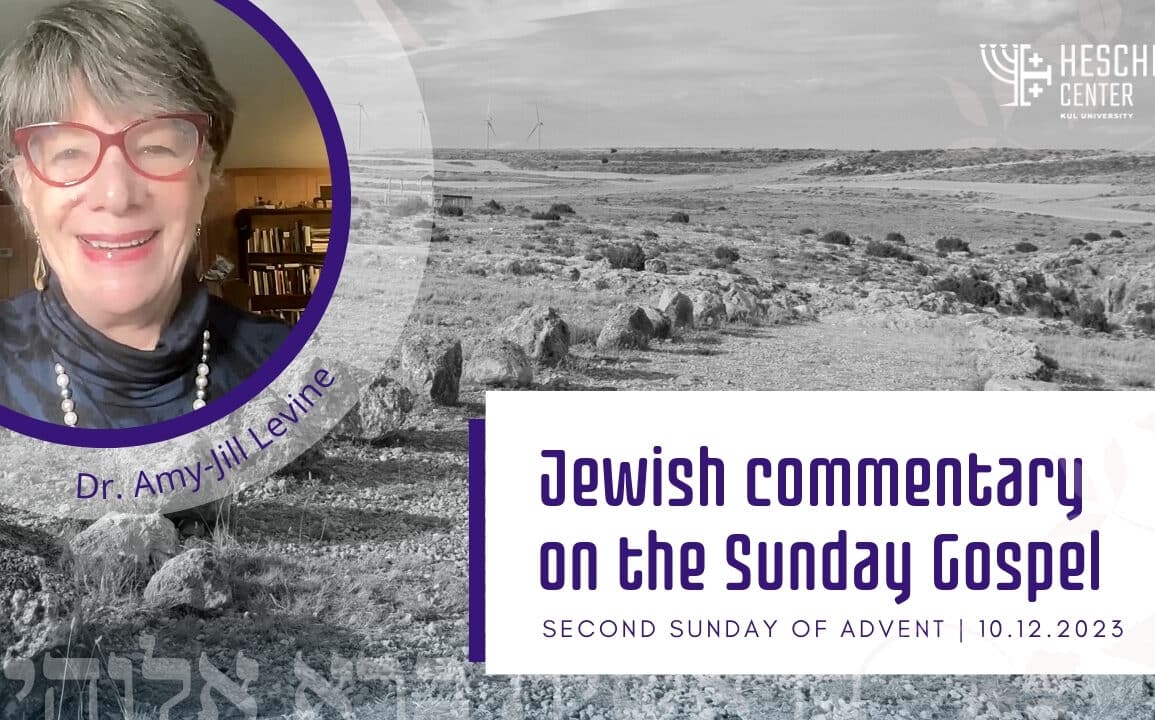For Jews, Isaiah’s message concerns the promise of the return of the covenant people to their land. In Mark’s Gospel, the prophet’s words are read in the context of St. John announcing the coming of Jesus. Christians can gain a better understanding of Jewish devotion to their homeland by taking into account the context. They can also appreciate the loyalty of Jewish people towards Israel and the message of consolation that is meant for all people. In a commentary for the Catholic University of Lublin’s Heschel Center, Dr. Amy-Jill Levine, the first Jewish woman to teach the New Testament at the Pontifical Biblical Institute in Rome, explains how Jews and Christians understand the words of the prophet Isaiah, which were alluded to by John the Baptist on the Second Sunday of Advent. Her commentary is for Sunday, December 10.
The passage from the fortieth chapter of the Book of the Prophet Isaiah is referred to by St. John the Baptist in the Gospel of the Second Sunday of Advent. However, Jews interpreted this passage differently in the 6th century BC than in Jesus’ time. Moreover, it still holds a different meaning for Christian readers and for Jewish readers.
Isaiah exclaims: “In the wilderness prepare the way of the Lord! Make straight in the wasteland a highway for our God!” (Isaiah 40:3). “For the Jews in Babylon in the 6th century BC and for modern Jews, Isaiah’s message is about the Jewish homeland. Isaiah speaks of a voice – perhaps that of an angel or prophet – commanding the Jews in Babylon to +prepare the way of the Lord, make straight in the wasteland a highway for our God+,” Dr. Levine explains.
Over the centuries, this passage has taken on yet another meaning for Jews. In modern times, the passage from the prophets read on Shabbat after Tisha be-Av is known as haftarah. Dr. Amy-Jill Levine explains that the day of fasting is meant to commemorate the destruction of the Two Temples in Jerusalem, as well as several other tragic events that have affected the Jewish people throughout history. These include the First Crusade, during which Christians brutally massacred Jews in France and the Rhineland, as well as various expulsions of Jews from different countries.
These dramatic events, however, brought hope. “They are all about consolation. Then, according to the Jewish calendar, comes Rosh Hashanah, or the new year. The Jewish liturgical cycle emphasizes that a national tragedy is not the end of history. There will be consolation and restoration in our time or the Messianic era,” writes the first Jewish woman to teach the New Testament at the Pontifical Biblical Institute in Rome.
For Christians, Isaiah’s words point primarily to Jesus. In his announcement of the coming of the Savior, John the Baptist referenced the prophets Isaiah and Malachi. “While Isaiah spoke of a voice telling Jews in exile to build a road in the wilderness, Mark describes John as a voice calling in the wilderness. Grammatically, Mark moves the comma: Isaiah mentions “A voice crying out COMMA ‘In the wilderness, prepare the way'”; Mark presents “a voice crying out in the wilderness, COMMA ‘prepare the way.'”
Words can also change meaning. The professor of New Testament and Jewish Studies cites examples of the words “Lord” and “way.” “First, Isaiah’s ‘Lord’ – in Hebrew, the tetragrammaton, YHWH – is in Mark’s Greek, kyrios, a title for Jesus. Second, the Hebrew for way or road is derekh, which can also refer to how one walks or the manner in which one lives. The Greek translation is hodos. The earliest followers of Jesus were not called Christians; they were called “followers of the hodos,” the “way.” Dr. Levine explains that in Mark, the passage “The Way of the Lord” from Isaiah has a Christological meaning. “Way” means being a follower, and “Lord” is Jesus.
For Jews, Isaiah’s appeal foreshadows a consolation – a return from exile to the homeland, while for followers of Christ, it is a telling foreshadowing of another consolation – the coming of the Savior. “With this broader knowledge, Christians can better understand the Jewish attachment to the homeland, the fidelity of God to the people of Israel, and the need of all people for messages of comfort,” Dr. Levine concludes.
Entire commentary:
Biblical texts generate multiple interpretations. The rabbinic description for this phenomenon is shiva panim l’Torah, “seventy faces to the Torah.” The image suggests that each verse, each phrase, is like a beautifully cut gem with intensely shining facets. When we read Scripture, we should see multiple facets, and so discover multiple meanings.
Scripture will always yield different meanings, since we always bring different perspectives to it. Jews in exile in Babylon, the people to whom Isaiah spoke, received a different message than people hearing Isaiah in first-century Galilee, or twenty-first century Poland. Jews will understand Isaiah’s words differently from Christians.
Our Scriptures also generate different meanings because words change meaning over time and because those ancient texts contain no punctuation.
For Jews in 6th-century BCE Babylon, and for Jews today, Isaiah’s message concerns the importance of the national Jewish homeland. Isaiah speaks of a voice – perhaps of an angel, or a prophet – telling the Jews in Babylon to “prepare the way of the Lord… Make straight in the wasteland a highway for our G-d.” Otherwise put, Isaiah exhorts them to build a road, because they are going home.
Further, when the way is prepared, “Then the glory of the Lord shall be revealed.” How? Because “All people shall see” the power of G-d in repatriating the covenant community.
Today, for Jews, Isaiah 40, with its message of Nachamu, “comfort,” is the haftarah, the passage from prophets, read on the Sabbath after Tisha b’Av, the fast day commemorating the destruction of the Two Temples in Jerusalem, the first Crusade in which Christians massacred Jews in France and Rhineland, the expulsion from Christian England in 1290, Christian France in 1306, and Christian Spain in 1492, the Shoah, and other tragedies that have befallen Jews over two and a half millennia. This is the first of seven successive Sabbath haftarot from Isaiah, all concerning comforting. Then comes Rosh HaShanah, the new year. The Jewish liturgical cycle insists that national tragedy is not the end of the story: comfort and restoration will occur, whether in our own time or in the messianic age.
For Mark, Isaiah speaks not about return from exile but about the Baptizer proclaiming Jesus’s advent.
Mark’s words, “Behold, I am sending my messenger ahead of you, he will prepare your way” paraphrases Malachi 3.1, “Behold, I am sending my messenger to prepare the way before me.” Malachi ends with the prediction of the return of the Prophet Elijah, the role Mark assigns to the Baptizer. Then Mark inserts Isaiah 40.3. While Isaiah spoke of a voice telling Jews in exile to build a road in the wilderness, Mark describes John as a voice calling in the wilderness. Grammatically, Mark moves the comma: Isaiah mentions “A voice crying out COMMA ‘In the wilderness, prepare the way’”; Mark presents “a voice crying out in the wilderness, COMMA ‘prepare the way.’”
Words also change connotations. Here are two examples. First, Isaiah’s “Lord” –in Hebrew the tetragrammaton, YHWH – is in Mark’s Greek, kyrios, a title for Jesus. Second, the Hebrew for “way” or “road” is derekh, which can also refer to how one walks or the manner in which one lives. The Greek translation is hodos. The earliest followers of Jesus were not called Christians; they were called “followers of the hodos,” the “way.” Thus, Isaiah’s “Prepare the way of the Lord” has for Mark Christological import: the “way” is discipleship, and the “lord” is Jesus.
For Mark and so for Christians, Isaiah speaks of John and Jesus and their followers. Christians should also recognize how Isaiah spoke to the Jews of his own time, and how Isaiah speaks to Jews subsequently. With this broader knowledge, Christians can therefore better understand the Jewish attachment to the homeland, the fidelity of Israel’s G-d to the people Israel, and the need of all people for messages of comfort.
About the author:
Amy-Jill Levine is University Professor of New Testament and Jewish Studies Emerita and Mary Jane Werthan Professor of Jewish Studies Emerita at Vanderbilt University. She is also Rabbi Stanley M. Kessler Distinguished Professor of New Testament and Jewish Studies, Hartford International University for Religion and Peace. In the spring of 2019, she became the first Jew to teach a course on the New Testament at the Pontifical Biblical Institute in Rome; in 2021, she was elected a member of the American Academy of Arts and Sciences.
Heschel Center of the Catholic University of Lublin










